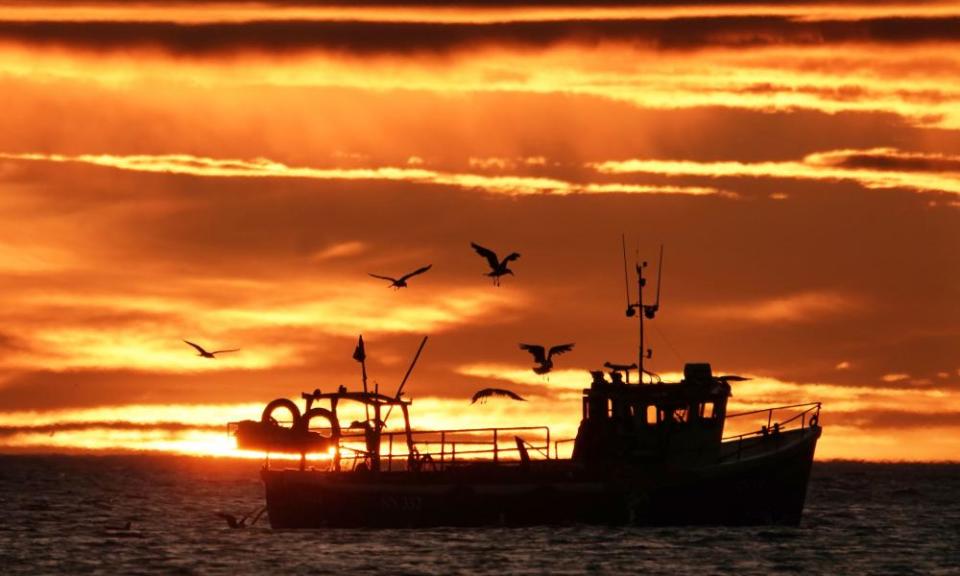Letters: Britain at fault for Brexit fishing woes

Your interesting article did not explain why so much fish in British waters is now caught by boats from other EU countries (“Brixham fishermen hope Brexit will tip the scales for shrinking industry”, Business). In the late 1980s, grants from Europe were made available for fishing communities to modernise their boats and tackle. This funding had to be match-funded by national governments. Other governments supplied this funding, unlike the UK. The result was that British fishermen were unable to compete with the bigger, more efficient boats, and many sold their quota to French, Spanish or Dutch fishing companies. The quotas were introduced to preserve fish stocks.
The reason the future of fishing is so fraught in the Brexit negotiations is that other European nations paid British fishermen to be able to fish for what had been British quotas.
Veronica Hardstaff, MEP for Lincolnshire 1994-1999 and former member of the European parliament fishing committee, Sheffield
The most serious threat to the UK fishing fleet is that 37% of fish caught by UK boats are landed in the European Economic Area, with the largest shares being exported to Norway, the Netherlands and France. The UK fleet may well want a larger quota of available stocks, but the main species found in UK waters are mackerel and herring, which do not have a UK market. The continuation of EU/EEA landing rights without tariffs, quotas or phytosanitary restrictions is far more important than sharing a few cod with France. A no-deal Brexit would result in the loss of substantial and valuable exports for the UK fishing fleet.
Eric Goodyer
Birsay, Orkney
Rough justice on golf course
It is regrettable that Aberdeen has granted planning permission for a new Trump golf course on the Menie estate (“New Trump golf course provokes fury in Scotland”, News). But had Trump been refused planning permission, he could have appealed directly to the Scottish government. But objectors to planning applications have no equal right of appeal, despite repeated attempts to get this introduced into Scottish law.
Should Trump act on his granted permission, the invaluable coast and dunes will be further destroyed.
Rose Harvie
Dumbarton, West Dunbartonshire
Arts bailout ‘blackmail’
I am appalled that arts organisations are being compelled to give public praise to named members of the government and to the Treasury and Arts Council England (“Want an arts bailout? Then you’d better praise Sunak & co”, News). Were the artists told that this blatant blackmailing would be integral to the government’s culture recovery fund?
It appears the government is shamefully taking advantage of the Covid crisis to bring the arts to heel and to give the appearance that artists are supportive of its notoriously unprincipled behaviour.
Philip Hedley, director emeritus, Theatre Royal Stratford East,
London WC1
Land is our heritage too
Joe O’Donnell, the director of the Victorian Society, is not alone in his concerns about the government’s proposed changes to the planning system (“‘Greatest threat in a generation’ faces heritage buildings”, News). Heritage is just one of several qualities that places possess. He cites English Heritage research on the carbon savings of refitting existing buildings. In Wales, government agencies were quick out of the blocks, introducing in 2008 their unique land use information system, Landmap, with its all-Wales coverage of areas that merit being taken into account in land management and change decision-making. This information base of more than 10,000 areas is freely available online, just the kind of thing England’s public sector ought to introduce without delay to ensure a place’s qualities are properly understood and not wasted, for example, in carbon-costly new developments or habitat loss.
David Eagar
Birmingham
Word ban is hard to swallow
Barbara Ellen hit the nail on the head in her criticism of the powerful meat industry’s attempt to ban words such as “banger” and “burger” in relation to similar-tasting alternatives that cut out the cruelty (“Bangers and burgers belong to us vegetarians and vegans too”, Comment). It is obvious that the meat industry does not, and cannot, own words.
The use of the phrase “cultural hijacking” by the meat industry is frankly hilarious and rather pathetic. The only “hijacking” I can see is directed towards our planet, exploiting its precious resources for the mere benefit of a consumer to buy a chunk of butchered meat.
Sebastian Monblat
Sutton, London
Held back by my class
I share Kenan Malik’s scepticism about the reporting, both political and academic, of the assumed educational disadvantage of “white”, working-class boys (“Being white won’t hold boys back. Being working class just might”, Comment). I am from a northern, white, working-class background, failed the 11-plus and then got to university from a secondary modern, which limited my academic choices and future.
I found the work of the French sociologist Pierre Bourdieu a useful insight into this “disadvantage”. Like Malik, he contended that the main factor was the constrained life chances of being working class; he contended that this was “operationalised” through “cultural capital”. Our heavily exam-based, traditional and elitist schooling and curriculums are biased towards “middle/upper class cultural capital”, with all the enrichment, private tutoring and access to literary/musical/cultural opportunities that go with it.
Philip Wood
Kidlington, Oxfordshire
Sins of the Flesh
Your article on the “lost” Nic Roeg Flash Gordon film does not mention that an “erotic” comedy version titled Flesh Gordon actually was released in 1974 (“Flesh Gordon? Artwork reveals erotic version that was never made”, News). Having sneaked in to see this film aged 15 in the days before ID was required, I can vouch that it was neither erotic nor particularly comedic, although I do remember many people in the audience rolling about with laughter at the heavy-handed script. But a Nic Roeg version I would love to have seen!
Dougie Mitchell
Edinburgh

